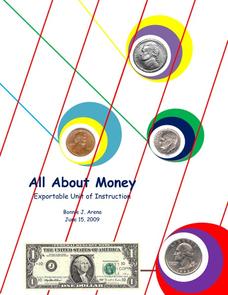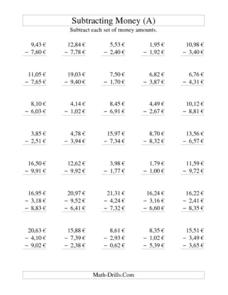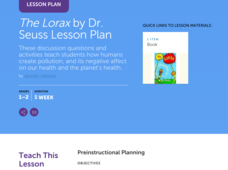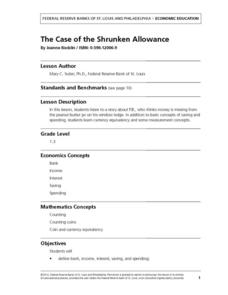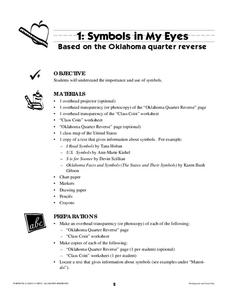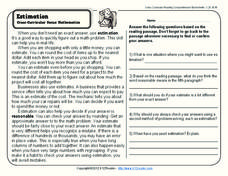Curated OER
All About Money
Few topics engage young mathematicians as much as learning about money. Through a series of shared readings and hands-on activities, children explore the US currency system, learning how to count money and calculate change as they create...
Attainment Company
Money Skills
Young mathematicians learn to make sense out of money with this collection of skills practice worksheets. From identifying the different coins and bills in the US currency system, to counting money and correctly using the dollar and...
Math Drills
Subtracting Money (A2)
Work with money math in subtraction activity. With 35 subtraction problems in column format, the assignment is a good resource for review, new skills, or for assessment.
Math Drills
Subtracting Money (A)
Whether you need a simple math drill or a review lesson on money math, a straightforward learning exercise will challenge even your most advanced math learners. With 35 subtraction problems featuring one- and two-digit numbers, the...
Scholastic
The Lorax by Dr. Seuss Lesson Plan
Celebrate the whimsical world of Dr. Seuss with a lesson that features the memorable tale of The Lorax. After listening to a riveting read-aloud, scholars take part in a grand conversation about the story and environment. Then...
Federal Reserve Bank
The Case of the Shrunken Allowance
An allowance is an important thing! Make sure your kids know how to save and spend their own money. Using the book The Case of the Shrunken Allowance as a starting point, this plan covers income, spending and saving, counting, and more.
Federal Reserve Bank
Something Special For Me
People often save money, but what are the benefits and drawbacks of that action? Youngsters learn about saving, savings, and opportunity cost through the lens of a short book, called Something Special for Me.
Illustrative Mathematics
Field Day Scarcity
Introduce young mathematicians to concepts of financial literacy with this open-ended word problem. With seven dollars to spend during field day and given a list of available items and their prices, children must determine how they want...
US Mint
Coin Connections
Help young mathematicians make cents out of the US currency system with this two-part math instructional activity. Children first learn the names and values for each type of coin, before learning to count and compare the values of coins...
National Woman's History Museum
Susan B. Anthony: She's Worth a Mint!
A instructional activity all about Susan B. Anthony showcases the Civil Rights leader's contributions towards equality. A Susan B. Anthony coin sparks engagement. Scholars take part in a discussion that sheds light on what being an agent...
Federal Reserve Bank
Financial Fables: Shopping Wisely with Olivia Owl
Cover two subjects with one lesson! First, dive into English language arts; read an eBook, answer comprehension questions, and complete a cause and effect chart about the financial fable, Shopping Wisely with Olivia Owl. Then, take...
Baylor College
Food: The Math Link
Enrich your study of food science with with these math worksheets. They offer a variety of food-related word problems that are great practice for multiplying, identifying fractions, estimating length, and performing calculations...
The Digits
Telling Time: The Digits
Time to teach your students how to read a clock? This resource is here to help! Engaging young mathematicians with two fun videos and a series of hands-on activities, these lessons offer a multimedia approach to teaching this important...
Busy Teacher’s Café
"Smart" by Shel Silverstein
Find out just how smart your young mathematicians are with this cross-curricular math and language arts lesson. After first reading Shel Silverstein's poem "Smart", students draw pictures of coins to model the different exchanges...
Center for Learning in Action
Water—Changing States (Part 1)
Here is part one of a two-part lesson in which scholars investigate the changing states of water—liquid, solid, and gas. With grand conversation and up to three demonstrations, learners make predictions about what they think will happen...
Curated OER
Tell Me; I’ll Listen
Encourage respect, responsibility, and caring within your classroom with a collection of lessons that spark dialogue and self reflection. To address character traits, lessons touch on topics such as staying safe in the...
Homeschool Creations
Caps for Sale Printables
Caps for sale! Get your class into some monkey business with a fun set of activities based on Esphyr Slobodkina's Caps for Sale. Pupils practice tracing lines between caps and monkeys, identify colors of caps,...
US Mint
Symbols in My Eyes
Explore the hidden meanings behind the images on US currency with this elementary school lesson on symbolism. Starting with a class discussion about symbols, children go on to brainstorm different objects that represent the Unites...
Curated OER
My Foot and the Standard Foot
Young mathematicians put one foot in front of the other as they learn how to measure length in an elementary math lesson. Using paper cutouts of their own feet, children measure classroom objects as they discover the importance of...
Visa
Earning Money
Where does money come from? Is it limitless and always available? Introduce your youngsters to the concept of earning through jobs and/or chores with a matching activity and provided worksheets.
Visa
Making Spending Decisions
By role playing real-world experiences, such as purchasing snacks and grocery/toy store shopping, your youngsters will begin to develop an understanding of how to make decisions and choose between alternatives. This is the first...
Curated OER
Penny Science
A penny can be a much more valuable teaching tool that you might think. Whether you are teaching about chemical reactions, surface tension, the behavior of gases, or are just looking for engaging activities for early finishers,...
Spreading Gratitude Rocks
Gratitude Bank
Money isn't the only type of currency that fills a piggy bank. Learners practice filling their banks with the the things that make them grateful. Pupils write about their talents, relationships, challenges, and life skills, making...
K12 Reader
Estimation
When is it a good idea to use estimation? Learn about estimation and rounding with a reading comprehension lesson. After kids read a passage about estimation, they answer five comprehension questions on the other side of the page.
Other popular searches
- Money Lessons Giving Change
- Counting Money Lessons
- Canadian Money Lessons
- Second Grade Money Lessons
- 2nd Grade Money Lessons
- Australian Money Lessons
- Shopping Money Lessons
- Math Money Lessons
- Money Lessons Elementary
- Fun Money Lessons
- Counting Money Math Lessons
- Adding Money Amounts Lessons


